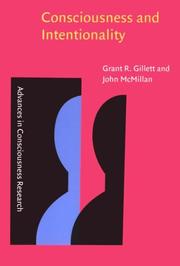| Listing 1 - 3 of 3 |
Sort by
|

ISBN: 9027251479 155619997X 9786612163944 1282163949 9027299870 9789027299871 9781556199974 9781282163942 6612163941 Year: 2001 Volume: 27 Publisher: Amsterdam Benjamins
Abstract | Keywords | Export | Availability | Bookmark
 Loading...
Loading...Choose an application
- Reference Manager
- EndNote
- RefWorks (Direct export to RefWorks)
Is there an internal relationship between consciousness and intentionality? Can mental content be described in such a way so as to avoid dualism? What is the influence of social context upon consciousness, conceptions of self and mental content?This book considers questions such as these and argues for a conception of consciousness, mental content and intentionality that is anti-Cartesian in its major tenets. Focusing upon the rule governed nature of concepts and the grounding of the rules for concept use in the practical world, intentional consciousness emerges as a phenomena that depends upon social context. Given that dependence, the authors consider and set aside attempts to reduce human consciousness and intentionality to phenomena explicable at biological or neuroscientific levels. (Series A).
Cognitive psychology --- Theory of knowledge --- Consciousness. --- Intentionality (Philosophy) --- Conscience --- Intentionnalité (Philosophie) --- Consciousness --- Motivation --- Thinking --- Social Perception --- Psychophysiology --- Mental Processes --- Behavior and Behavior Mechanisms --- Emotional Intelligence --- Perception --- Cognition --- Intelligence --- Personality
Digital
Year: 2001 Publisher: Cambridge, Mass. NBER
Abstract | Keywords | Export | Availability | Bookmark
 Loading...
Loading...Choose an application
- Reference Manager
- EndNote
- RefWorks (Direct export to RefWorks)
Book
Year: 2001 Publisher: Cambridge, Mass. National Bureau of Economic Research
Abstract | Keywords | Export | Availability | Bookmark
 Loading...
Loading...Choose an application
- Reference Manager
- EndNote
- RefWorks (Direct export to RefWorks)
Post-communist countries offer new evidence on the relative importance of courts and relationships in enforcing contracts. Belief in the effectiveness of courts has a significant positive effect on the level of trust shown in new relationships between firms and their customers. Well-functioning courts also encourage entrepreneurs to try out new suppliers. Courts are particularly important when specific investments are needed for a relationship to develop. While relationships can sustain existing interactions, workable courts help new interactions to start and develop.
| Listing 1 - 3 of 3 |
Sort by
|

 Search
Search Feedback
Feedback About UniCat
About UniCat  Help
Help News
News